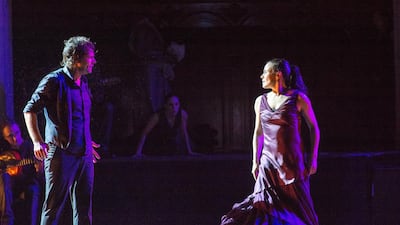Using the Spanish folkloric art form of flamenco as a vehicle to retell an Ancient Greek drama is not a 21st-century aesthetic stunt, says Martín Santangelo, but a reading far closer to what the dramatists of ancient Athens intended.
The director and choreographer employs flamenco's holistic mix of music, dance and song to retell Sophocles's play Antigone in an acclaimed stage production by his New York-based company Noche Flamenca.
Titled Antigona, it debuts on Thursday at The Arts Center at New York University Abu Dhabi. The shared vocabulary between the two traditions – separated by more than 2,000 years – is an inevitable build to a moment of catharsis, he says.
“What the Greeks were doing was basically musical theatre,” says the 53-year-old, who describes his nationality as “New Yorker”. “Their tools [were] singers, dancers and music – and my tools are the same.
“The Greek scholars who have seen the show say this is much more similar to what they imagined Greek theatre to have been. It is curious because music tells you what to feel, the dance is the visceral emotional expression, and then you have the intellectual part, which is the sung words – and all of that exists in flamenco also.”
Written in 441BC, Antigone is the last of three "Thebian" plays, about the mythical king Oedipus, written by Sophocles. Its title character is often described as the "first heroine" in history.
In Santangelo’s retelling, the role goes to his wife and long-term collaborator, the star dancer Soledad Barrio.
“I’ve always been enamoured by my wife as a dancer, but as an actress, it is over the top, it is extraordinary,” he says. “It is really witnessing a woman turn her self inside out and bare her soul naked to the world.”
The couple founded Noche Flamenca in Madrid in 1993, a year before they married. They shared the stage for more than a decade before Santangelo, also a dancer, stepped out of the spotlight to concentrate on directing.
“It is the only place I can tell her what to do,” he says with a laugh.
The son of Argentine modern dancer Luly Santangelo, he was born and raised in New York City. At the age of 4, their Greenwich home was transformed when his mother’s dancer friend, Carmen Maya, moved in with her husband – the seminal figure Mario Maya: “the Stanislavski of flamenco”, says Santangelo.
“They were only meant to stay a month,” he adds. “But that turned into four years.”
In that time, a succession of Spanish dance and music legends – outcast from Franco’s Spain, where public flamenco performances were banned – would visit to rehearse or party.
Santangelo would hear masters such as Paco de Lucía and Camarón de la Isla jamming in his front room.
“I remember ... just being blown away,” he says. “Here I am in New York City, at that age when you’re a sponge, being exposed to the greatest flamenco on Earth.”
At 17, Santangelo moved to Madrid. He studied with masters including Ciro, Paco Romero and El Guito, only returning to the Big Apple three years ago. The premiere, in 2014, of Noche Flamenca's Antigona followed soon after.
For his first classical adaptation, Santangelo began singling out the play’s key scenes and stripping them to their core, essential dialogue. He then set the text, translated into Spanish, to music, working for two years with two guitarists. With this “road map” in place, only then were dancers brought in – the choreography for the 11 of them took a further year.
“My biggest goal in this whole process was to tell the story,” says Santangelo. “I’ve been to a lot of dance-theatre pieces, and you usually walk out going ‘wow’, until somebody says: ‘What was it about?’.”
Santangelo’s only goal was to serve the story – a timeless tale he believes is as pertinent as ever, more than two millennia later.
“I’m so happy I found Sophocles in my life, so happy, because I learnt so much from the guy,” he adds.
"The biggest lesson in Antigone, and what I'm trying to say with this, is that when we become dictators we lose our humanity, and we mess up people's lives. That happens in politics, in family, in our work life – and that's the biggest lesson, because I'm a director."
• Noche Flamenca’s Antigona is at the Red Theater, NYUAD, Thursday, April 6 at 8pm, and Friday, April 7 at 1pm and 8pm. For more details, visit www.nyuad-artscenter.org
rgarratt@thenational.ae

